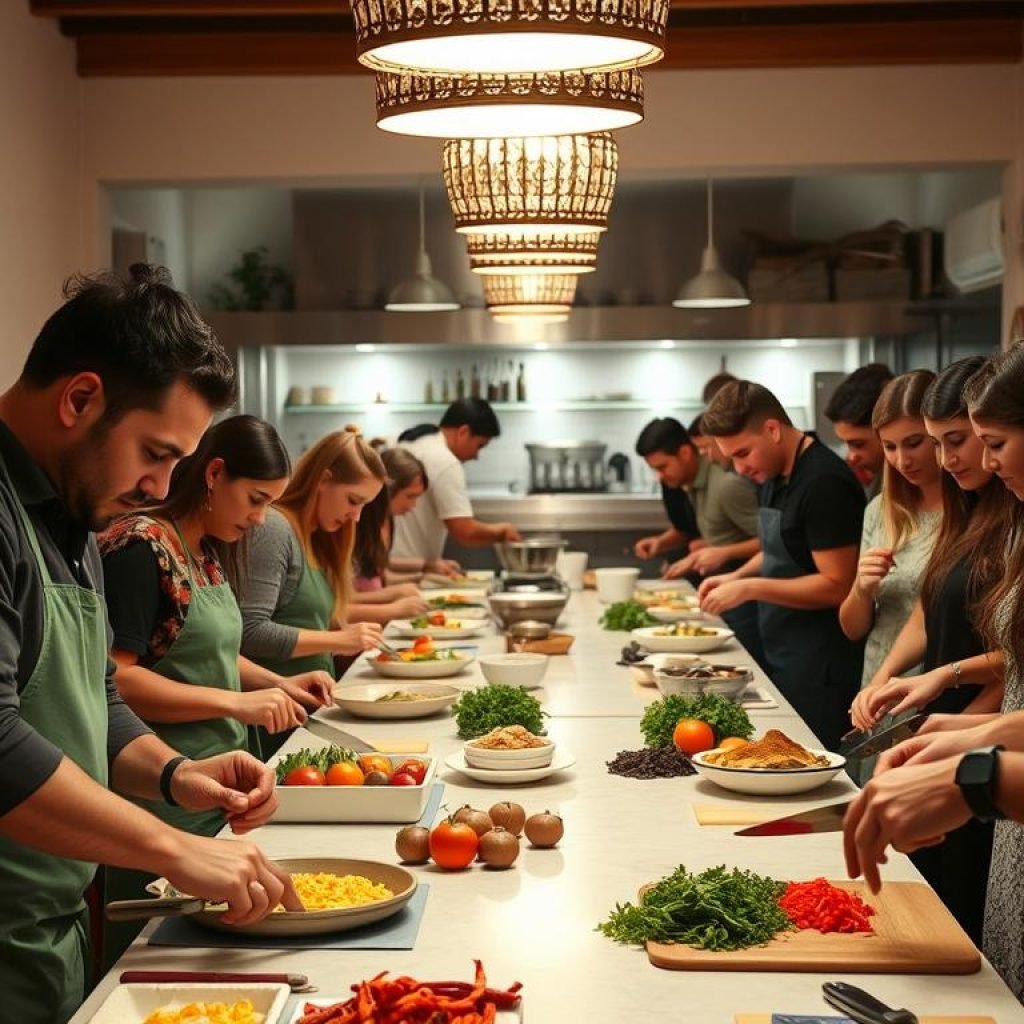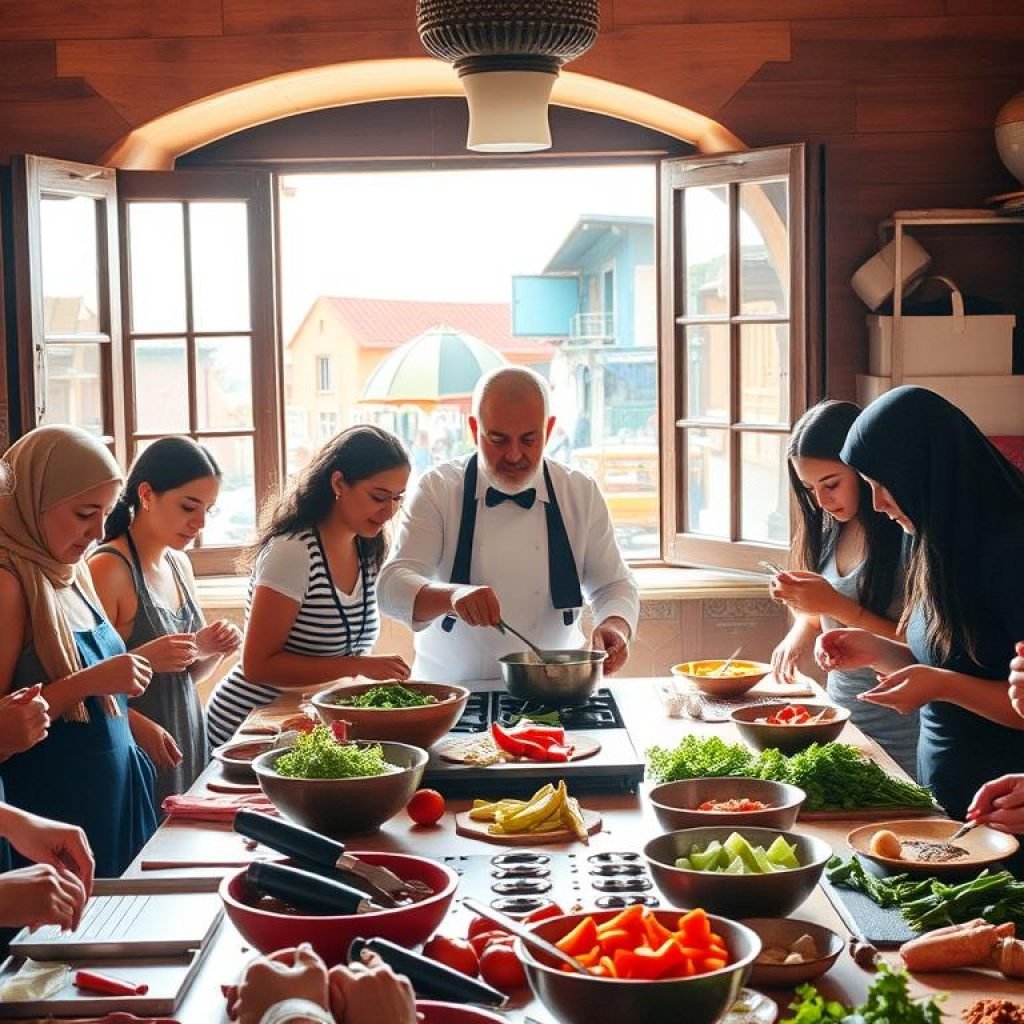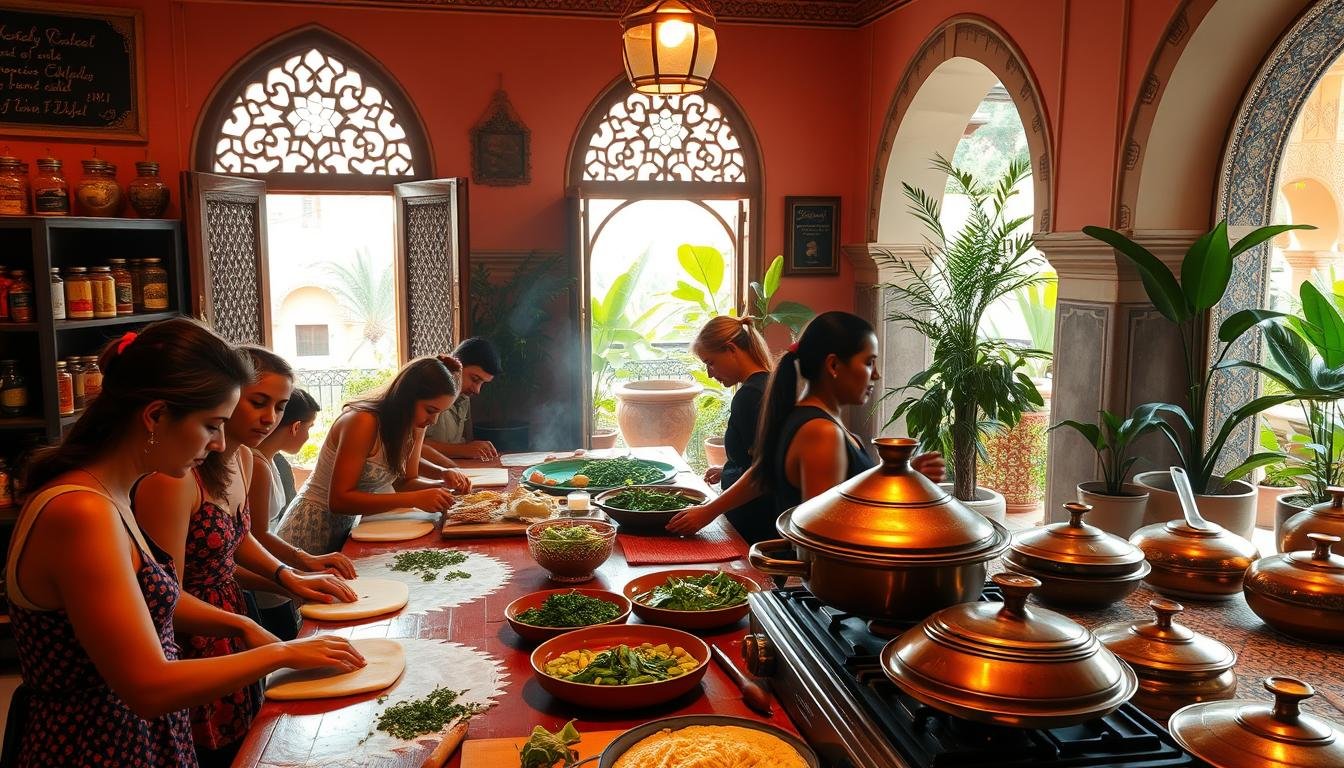Imagine diving into the lively tastes and smells of Moroccan food. You could learn how to make real Moroccan dishes like tagines and couscous in a cooking class. A Moroccan cooking class is a great way to dive into the country’s rich food culture and learn about Moroccan recipes.
With many traditional dishes to try, you’ll get to know Morocco’s culture and food better. It’s a chance to see the beauty of Moroccan cuisine up close.
Key Takeaways
- Learn about traditional Moroccan cuisine and its rich flavors
- Discover the art of preparing authentic Moroccan dishes, such as tagines and couscous
- Immerse yourself in a hands-on Moroccan cooking class experience
- Explore the country’s culture and cuisine through Moroccan recipes
- Gain a deeper understanding of the country’s culinary heritage
- Enjoy a unique and enriching experience in a Moroccan cooking class
- Take home new skills and recipes to recreate traditional Moroccan dishes
Introduction to Moroccan Cuisine
Moroccan cuisine is a mix of Berber, African, Arabian, and European flavors. This blend creates a unique and aromatic cooking style. In a cooking workshop or class, you’ll learn about Moroccan ingredients and techniques.
A cooking workshop includes making traditional dishes, learning about food culture, and tasting your creations. In a hands-on class, you’ll work with chefs to uncover Moroccan cooking secrets. You’ll learn about preserved lemons, harissa, and spice blending.
Traditional Moroccan ingredients include orange blossom water, olive oil, and fresh herbs. These are mixed with meats, veggies, and grains to make tasty dishes. By joining a workshop or class, you can learn to make these dishes and enjoy Moroccan flavors at home.
In a typical class, you’ll learn to make dishes like tagines and couscous. These are served with sides like salads, bread, and olives. Learning about Moroccan ingredients and techniques helps you appreciate its culture and history.
Benefits of Taking a Cooking Class
Learning to cook Moroccan food is a rewarding experience. Taking a cooking class is a great way to do this. It offers a hands-on learning experience and a chance to meet others with similar interests.
By joining a cooking class, you can learn to cook Moroccan food in a fun way. This experience helps you gain practical skills and build confidence in cooking. Many people find their cooking skills improve a lot after taking a class.
Some key benefits of cooking classes include:
- Hands-on learning experience, allowing participants to learn by doing
- Opportunity to socialize with others who share similar interests
- Improved culinary skills and confidence in cooking abilities
- Exposure to new ingredients and cuisines, such as Moroccan food

Overall, cooking classes are a great way to enhance your culinary skills. They offer hands-on learning and a chance to meet new people. If you want to improve your cooking skills and confidence, a cooking class is a good choice.
Choosing the Right Cooking Class
When picking a Moroccan cooking class, think about what you want. You should aim for a class that teaches you to make real Moroccan dishes. A great class lets you get your hands dirty, learning from chefs who know their stuff.
A cooking workshop is a great way to dive into local food and culture. Look for classes that teach you to make dishes like tagines and couscous. Morocco has many schools, offering classes for all skill levels, so you can find one that fits you.
Popular spots for Moroccan cooking classes include La Maison Arabe, Dar Les Cigognes, and Farm to Table Marrakech. These places offer classes from a few hours to all day, and sometimes even a trip to the market. Think about what you want to learn, what dishes you want to make, and how much you can spend.
Do your homework and read what others say about the classes. Look for experiences that are truly unique, like cooking in a riad or on a farm. The right class will let you understand Moroccan culture and food better, and you’ll learn new recipes to try at home.
What to Expect in a Class
A hands-on cooking class is a great way to learn Moroccan food. It lasts from a few hours to a full day. You’ll get to make many traditional Moroccan dishes.
Classes vary in length and what they cover. But, most include cooking and learning about Moroccan food.
When you join a cooking class, you’ll learn to make dishes like tagines and couscous. First, you’ll learn about Moroccan ingredients and cooking methods. Then, you’ll cook under the watchful eye of an expert.
Duration and Structure
Classes can last from 4 hours to a whole day. They mix cooking, learning, and socializing. Some classes even include a market tour to learn about local ingredients.
Types of Dishes You’ll Learn
In a typical class, you’ll make 3-8 dishes. You’ll learn to make traditional Moroccan recipes like tagines and couscous. You’ll also learn about Moroccan spices and how to use them.

Overall, a cooking class is a great way to learn Moroccan food. You’ll enjoy the rich flavors and traditions of Moroccan cuisine. Knowing what to expect makes for a fun and rewarding experience.
| Class Duration | Number of Dishes | Price Range |
|---|---|---|
| 4 hours | 3-8 dishes | $98 – $154 USD per person |
Essential Cooking Techniques
Traditional Moroccan cuisine is famous for its rich flavors and aromas. These are achieved through key cooking techniques. In a cooking workshop, you can learn to make authentic Moroccan dishes using traditional methods and ingredients.
One important technique is tagine cooking. It involves slow-cooking meat and vegetables in a clay pot with a conical lid. This method helps to blend flavors together.
Spice blending and usage are also crucial in Moroccan cooking. Moroccan spice blends, like Ras el Hanout, include cumin, coriander, and cinnamon. These spices add flavor and aroma to dishes. In a cooking class, you can learn how to blend and use spices to make delicious Moroccan dishes.
These spices are used in various dishes, such as tagines, stews, and salads. Learning to use these spices and other traditional Moroccan ingredients lets you make authentic dishes at home.
In a cooking workshop, you can learn to make many traditional Moroccan dishes. This includes tagines, couscous, and pastries. You’ll also learn about the ingredients and spices used in Moroccan cooking. This knowledge helps you create unique and delicious flavors. Whether you’re new to cooking or have experience, a cooking workshop is a great way to learn about Moroccan cuisine.
| Dish | Ingredients | Cooking Method |
|---|---|---|
| Tagine | Meat, vegetables, spices | Slow-cooking in a clay pot |
| Couscous | Semolina flour, water, vegetables | Steaming in a couscousiere pot |
| Pastries | Flour, sugar, spices, nuts | Baking in a oven |
Popular Moroccan Dishes You’ll Learn
In a Moroccan cooking class, you’ll learn to make traditional dishes like couscous and harira. These are key dishes in Moroccan cuisine, often enjoyed at special times. You’ll discover their cultural importance and how to make them with traditional methods and ingredients.
A typical class will teach you about various dishes, including tagines, pastilla, and b’stilla. You’ll learn about Moroccan ingredients like spices, meats, and veggies. You’ll see how to mix them to create tasty, authentic dishes. A cooking class is perfect for those interested in Moroccan recipes or wanting to explore the country’s culinary culture.
- Couscous: Morocco’s national dish, made from semolina flour and steamed
- Harira: a soup with lentils, chickpeas, and tomatoes
- Tagine: a stew with meat, veggies, and dried fruits
- Pastilla: a pie with meat, onions, and spices
- B’stilla: a pastry with layers of dough and meat, onions, and spices
By taking a cooking class, you’ll understand Moroccan cuisine and culture better. You’ll also learn new cooking skills and techniques. Whether you love food or just want a unique experience, a Moroccan cooking class is a great choice.
Cultural Context of Moroccan Food
Traditional Moroccan cuisine is a big part of the country’s culture and identity. It’s not just about the food; it’s about the people and traditions too. Taking a cooking class in Morocco lets you dive into the local culture and way of life.
Food is key in Moroccan culture, bringing people together. Mealtimes are for bonding with family and friends. The sharing of food is a big part of this. To learn more, check out Moroccan travel tips and explore the country’s rich flavors and traditions.
The markets and souks in Morocco show off the country’s vibrant culture. Here, you can find fresh ingredients, spices, and traditional dishes. The sights, smells, and sounds of these markets give a unique look into Morocco’s cultural heritage.
Some key aspects of Moroccan culture and cuisine include:
- Respect for tradition and heritage
- Importance of hospitality and generosity
- Significance of food in bringing people together
- Vibrant markets and souks
- Rich cultural heritage and history
Understanding Moroccan food’s cultural context helps you appreciate the authentic dishes and culinary experience. Whether cooking, visiting markets, or dining with locals, the cultural context is essential.
Tips for Success in Your Cooking Class
To make the most of your cooking workshop, be ready and stay positive. A hands-on cooking class is a great way to learn Moroccan food. But, you need to actively participate and engage. Follow a few simple tips for a fun and productive cooking class experience.
Before your cooking class, review the recipes and ingredients. This will make you feel more at ease in the kitchen. Also, practicing at home can solidify new skills and techniques. Try cooking a new Moroccan dish every week and experiment with different ingredients and spices to find your own style.
Some key tips for success in your cooking class include:
- Arrive on time and be ready to participate
- Follow proper safety and food safety protocols
- Ask questions and seek feedback from the instructor
- Practice new skills and techniques at home
By following these tips and being open to new experiences, you can get the most out of your cooking class. You’ll develop the skills and confidence to become a proficient cook. Whether you want to learn Moroccan food or improve your cooking, a hands-on cooking class is a great way to achieve your goals.
Conclusion and Next Steps
As you leave your Moroccan cooking class, the flavors of what you’ve made stay with you. They make you want to learn more about Moroccan cooking. This class has given you a good start, but the real fun is in getting better and teaching others.
Keeping Your Culinary Skills Sharp
To keep improving, look for more ways to learn. Check out online tutorials, buy Moroccan cookbooks, or join a cooking group. This way, you can keep practicing and trying new things. It helps you understand Moroccan food even better.
Sharing Your Passion with Others
Sharing your cooking with family and friends is very rewarding. Host a dinner with Moroccan dishes you’ve learned. It’s a great way to enjoy your cooking and inspire others to try new things.
Keep exploring Moroccan cooking and enjoy the journey. You’ll learn a lot and make lasting memories. The flavors and experiences you gain will make your life richer.




Comment (0)